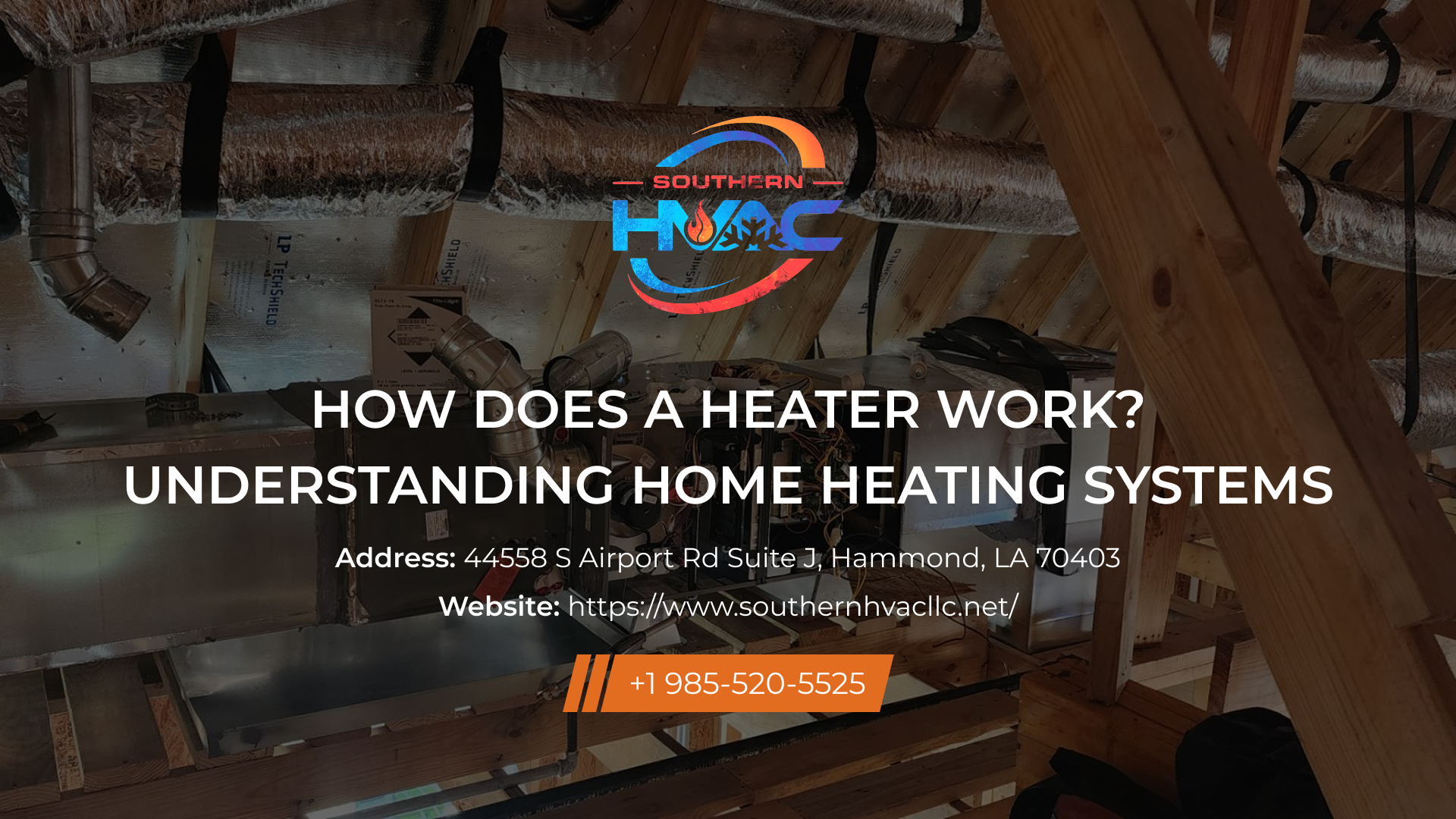4 Types Of Heating Systems: Pros, Costs & Best Use Cases

Understanding modern heating systems helps homeowners find the best heating solution for comfort and energy efficiency. Southern HVAC provides information on the 4 types of heating systems so that customers can choose the system that best suits their needs, climate, fuel source, and budget. By choosing the right equipment, homeowners can enjoy year-round comfort while reducing energy bills and preventing energy waste.
Key Takeaways
- The 4 major systems are furnace, boiler, heat pump, and baseboard heating.
- AFUE, HSPF, and SEER ratings enable homeowners to match performance and long-term expenses.
- Heat pumps work best in mild climates like Hammond; furnaces and boilers for colder climates.
- The right choice depends on available fuel (gas, electric, geothermal) and whether ductwork is present.
- Regular maintenance extends lifespan and enhances indoor air quality (IAQ).
- Southern HVAC provides expert installation for comfort, safety, and the best system performance.
What Are The Main Types Of Heating Systems?
We provide information on the most popular 4 types of heating systems in use today: furnace heating, boiler heating, heat pump heating, and baseboard heating. Each type distributes heat differently through air, water, or direct radiation - and has its own efficiency standards (AFUE, HSPF).
1. Forced-Air Furnace Heating Systems
Forced-air furnace heating systems include gas, electric, or high-efficiency furnaces. These systems heat air using a heat exchanger, then distribute it through ducts powered by a fan motor and regulated by a damper for balanced airflow.
2. Boiler & Radiant Heating Systems
Boiler and radiant heating systems provide a steady, consistent temperature through the circulation of water or steam. Systems such as hot water boilers, steam boilers, and hydronic radiant heating systems transfer heat using expansion tanks, circulation pumps, and heat exchangers, exhausting gases through a chimney. These setups create quiet, consistent comfort in any room.
3. Heat Pump Heating Systems (Air-Source & Geothermal)
Heat pump systems combine heating and cooling, making them an energy-efficient choice for Hammond’s mild winters and warm summers. The main types include air source, geothermalhybrid and ductless heat pumps. These energy-efficient heating systems transfer heat rather than generate it, reducing energy consumption.
4. Electric Baseboard or Space Heating (Supplemental Options)
Baseboard heating is an ideal heating system for home additions, garages, or rooms that need individual temperature control. Options include electric baseboard heaters, hydronic baseboard heaters, and wall-mounted heaters, each of which provides gentle, radiant heat. This type of radiator heating system is best used as a supplemental or zone control solution.
Comparison Chart: Costs, Efficiency & Climate Fit
Choosing the right types of heating depends on comparing performance, cost, and longevity. The chart below outlines the key features of each heating system to help determine which system is best suited for your home.
| Type | Efficiency Metric | Ideal Climate | Maintenance | Service Life | Notes |
|---|---|---|---|---|---|
| Furnace Heating | AFUE 80–98% | Cold & mixed | Heating maintenance yearly | 15–25 yrs | Reliable HVAC systems with ducts |
| Boiler Heating | BTU output varies | Cold | Annual tune-up | 20–30 yrs | Excellent IAQ, steady radiant heat |
| Heat Pump Heating | HSPF 9–12 / SEER 15–22 | Mild | Biannual check | 12–20 yrs | Ductless heating available |
| Baseboard Heating | - | Mild/small spaces | Low | 10–20 yrs | Low install, higher energy use |
In Hammond, professional HVAC installation and heating services ensure long-lasting performance and comfort in all seasons. Choose a heating system based on your individual needs, or contact Southern HVAC for specific advice and professional installation.
When comparing different equipment, it is also helpful to understand the expected lifespan. Check out our detailed document on
HVAC system lifespan to plan for long-term maintenance and efficiency.
How To Choose The Right Heating System For Your Home
Choosing the ideal system involves more than just price; it requires matching your home’s design, infrastructure, and energy goals. Homeowners should evaluate how the local climate, home layout, and available fuels affect performance and comfort.
Step 1 – Assess The Climate
Start by assessing the need for climate control to balance warm and cold air. In Louisiana, mild winters make energy-efficient heating options like heat pumps or hybrid systems great choices.
Step 2 – Check The Infrastructure
Check existing ductwork or radiant system before installation. Since essential components like ductwork and thermostats directly influence your choice, you may choose a ductless mini-split heating system to match the structure of your home if it doesn’t have ductwork.
Step 3 – Compare Budgets And Savings
Consider efficiency ratings such as AFUE, HSPF, SEER, and MERV when comparing models to find the right system for your needs. The right system saves energy and helps avoid wasteful energy usage that increases costs over time.
Step 4 – Consider Fuel Availability
Consider your available fuel source, a gas, electric, or geothermal heating system, based on your local fuel source. Note that proper sizing is required to avoid inefficiencies.
Schedule A Heating System In Hammond Today!
Schedule your heating system installation early to stay comfortable this winter! Contact Southern HVAC for reliable residential and commercial heating services throughout Hammond. Our team is ready to handle emergency heating services with care and precision.
FAQs
Which system is most efficient?
High-efficiency furnaces or heat pumps offer the best results. You should consider AFUE, HSPF, or SEER ratings to find a system that is highly efficient and reduces energy waste.
Which system works best in cold climates?
Gas furnaces or geothermal heat pumps provide consistent, long-lasting heat, making them a good choice for consistent comfort at low temperatures.
How long does a heating system last?
With regular maintenance, a heating system can last 15–25 years, while consistent care helps reduce repair costs and maintain performance.
Do all systems require ductwork?
No, ductless mini-split heating systems do not require traditional ductwork, provide room-to-room temperature control, and reduce energy loss.
What do AFUE and BTU mean?
AFUE measures fuel efficiency, while BTU represents heating power per hour. Units with higher AFUE and BTU ratings provide more heat with less energy.
How to improve indoor air quality?
Better indoor air quality (IAQ) comes from regular filtration, ventilation, dehumidification, and humidification. Regular maintenance of your HVAC system is essential for cleaner air and a cleaner home environment.









